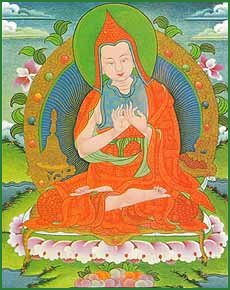The Great Chariot
by Longchenpa | 268,580 words
A Commentary on Great Perfection: The Nature of Mind, Easer of Weariness In Sanskrit the title is ‘Mahāsandhi-cittā-visranta-vṛtti-mahāratha-nāma’. In Tibetan ‘rDzogs pa chen po sems nyid ngal gso’i shing rta chen po shes bya ba ’...
Part 1 - The teaching of mind, the root of Dharma
When we undertake to find the natures of the environment and inhabitants of the phenomenal world, they are ascertained in analysis as being one:
Dharmas depend on mind, and likewise mind in turn
Depends on the freedoms and favors, arising in interdependence.
Now these many conditions and causes have come together.
The thing we chiefly need to do is tame our minds.
All dharmas depend on mind. Mind depends on the free and well-favored human body. This is the interdependent arising of the environment and inhabitants of the phenomenal world. Mind is the realm of Dharma, the cause of all that is wholesome. As it is the accompanying necessary condition of the freedoms and favors, in this situation of ours we must study exactly how to tame the mind. The Friendly Lettersays:
The Blessed One has said “You should tame your mind.
Mind is the root of Dharma, as it has been taught.
The Sutra Requested by Gyamtsho (rgya mtshos zhus pa’i mdo) says:
Lord of the naagas, Mind is the root of all dharmas. Since mental contents are emanated by mind, the nature of mind should be completely known.
The All-creating King (kun byed rgyal po), says:
All dharmas without remainder, however they appear,
Are emanated by mind, and are produced by mind.
The Sutra of the Descent into Lanka (lang kar gshegs pa’i mdo : lamkaavataara-suutra) says:
Although visual forms may appear within a mirror
They do not exist; and if we do not know
The appearances of mind as mere appearances,
The duality of conceptual thinking will arise.As habitual patterns join with what is competely pure,
There is the rising of variety from the mind.
Though, for human beings, external things appear,
Even though that is so, the world is only mind.
Also it says there:
As for mind itself that has no objects,
For mind disturbed by seeds of habitual patterns,
Appearances of objects will arise.
While the viewpoint of confused mind is nonexistent, dreamlike appearances of mind, arising from confused habitual patterns, arise as the variety of outer and inner. In reality they do not truly exist; but because they appear in mind as if they did, mind is the root of all dharmas. Though mountains and so forth appear externally projected from the viewpoint of confused mind, no mountains exist in mind. So it is explained. If students do not previously guard the mind, they will not be able to keep the disciplines. The Bodhicharyavatara says:
If this mind has not been guarded previously,
We will not be able to keep the disciplines.
Also it says there:
Aside from the kind of discipline that guards the mind,
What is the use of performing many disciplines?
Also it says there:
Thus it is that everything that frightens us,
And also all of our measureless pain and suffering,
Are only contents that have risen within the mind.
So it has been taught by the Speaker of Truth himself.Who was it that produced the multitude of weapons
For the use of sentient beings within the Hells?
Who was it that produced this ground of blazing iron?
From where did these multitudes of blazing flames arise?Every one of them, and all such things as these,
Are the mind of the evil-doer, so the Sage has said.
Thus it is that in the whole of this three-fold world,
There are no terrors that are other than the mind.
Also it says there:
If we ever succeed in taming the mind alone,
All these various things will likewise have been tamed.
Since all that is wholesome and unwholesome within samsara has arisen from mind, working to tame the mind is the root of all dharmas. The Sutra on The Clouds of the Three Jewels (Ratnamegha Suutra, dkon mchog sprin gyi mdo) says:
When we have been instructed by our worldly mind,
This mind of ours will never see the actual mind.
All our virtuous karma and that which has no goodness
Are nothing but collections in that worldly mind.
Also it says there in the chapter called, "Guarding the light:"
Mind in producing various karmas is like a painter.
In manifesting all harm, it is like an foreign foe.
In producing all suffering, it is like an enemy.
The Sutra on the Analytic Discrimination of Beings (a’gro rnam a’byed kyi mdo) says
The ground is made of iron, blazing hot,
Blazing tongues of flame are everywhere;
Also by the sharpened iron saws
A single body is sawn into eight.
Such things as these arise as mental contents,
From evil acts of body, speech, or mind.
Since mind is the root of all our joys and sorrows, our only effort should be to tame the mind.
